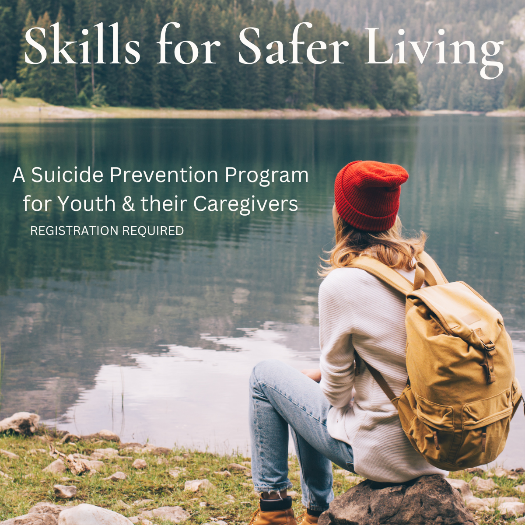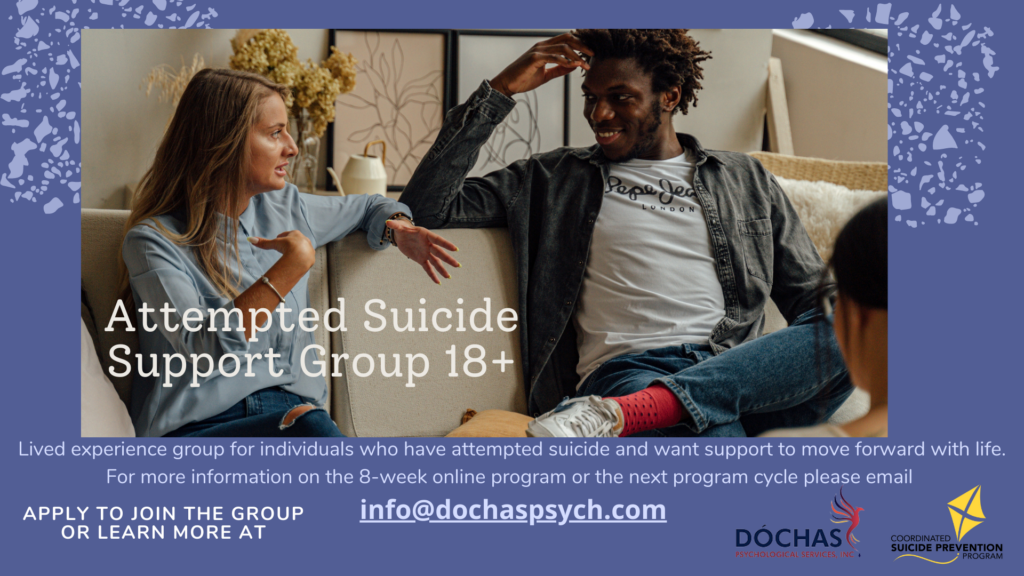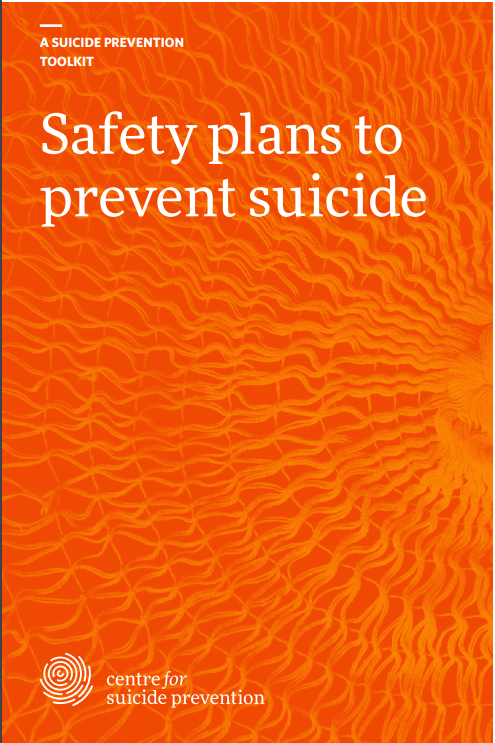Join an attempted suicide support group to meet other people who understand the impact of your experience.

This program is in partnership with the Centre for Suicide Prevention, The Coordinated Suicide Prevention Program, WestView Primary Care Network, Dochas Psychological Services, City of Spruce Grove and Parkland County.
Funding provided by the Government of Alberta & The Coordinated Suicide Prevention Program.
To participate in the program please contact Info@dochaspsych.com
The group is open to any individual looking for support after a suicide attempt, regardless of how recent the suicide attempt may be. The group will run for 8 weeks, online. The program will be facilitated by a registered psychologist who specialized in group facilitation and understands suicidality and will be supported by a facilitator who has lived experience through their own suicide attempts.
The program is about talking through your suicide and building healthier practices for your daily life.
Participants can expect:
- Pre-screening – all candidates will have an opportunity to have a one-to-one discussion with a member of the team to assess that a group setting is appropriate for you. All participants are encouraged to have individual counselling as part of the care.
- Group sessions are weekly. If you commit to the program it is important you attend most of the sessions and if you cannot attend you inform the group.
- Be authentic – this is a safe space for you to be honest about what is happening and how you feel.
- Safety – the group will co-design safety principals for the group to ensure everyone feels safe.
- Opportunity to improve the program – at the end of the session we will be looking to have your feedback on the program to help us improve the program.
- You are welcome back – you are welcome to apply for the program as many times as you need to, keep in mind, with your feedback the program will change over time.

Individuals interested in participating can contact Dochas Psychological Services Inc. at info@dochaspsych.com.
Looking for More Helpful Resources?
You may not understand all of the thoughts and feelings that led you to consider suicide, and that’s okay.
Many people who feel suicidal are experiencing a mental health concern, which is treatable. You may also have been experiencing stressful life events, found it difficult to express your feelings, or felt yourself isolating from others.
While you may still have challenges, many people who survive a suicide attempt begin to see those challenges in a new light and realize that there are people available to support them.
You don’t need to have all of the answers to heal from this experience. There is a way through.



You experienced a significant health event and just as you would while you are recovering from any other health concerns, you will need time, reflection, and support from others during your recovery.
1. Be kind to yourself. You have just survived a life-threatening health crisis and you deserve to take the time you need.
2. Take care of your health. Exercising, eating right, getting enough sleep and spending time with healthy people can have a huge impact on your health and mood.
3. Find a mental health professional. A good therapist or doctor can help you put this experience in proper perspective. They can also help you develop a safety plan and find ways to address life stressors.
4. Try a support group. There are different kinds of support groups, including those for depression and other mental health conditions and for those who have survived a suicide attempt. A group can help you know you are not alone.
5. Talk to those you trust. When you’re ready, let them know what happened and that you want them to help you stay safe.
Work Your Safety Plan
Set yourself small goals. Start by working to stay safe for 5-15 minutes at a time. Set a timer for yourself and commit to practice a coping strategy you set for yourself, use that time to make a phone call asking for help or to move yourself to a place of safety. Making a safety plan when you are not in crisis should allow you to recognize early when you are reaching a trigger and can help you to take actions that keep you safe when you don’t have the capacity to think through your actions or feel like there are no other choices.
Having a safety plan that addresses your triggers and supports is an essential component to your safety. It will help you take early action while you are still capable of taking actions and making decisions and will help understand what takes you to crisis. It will also serve as a cheat sheet when you need immediate help.
- Triggers. Recognize what puts you at risk.
- Coping strategy. Find coping strategies that do not rely on the presence of others but will help you self-regulate. (Ex: 5 in-3 hold-7 out breathing, mediation, working through the senses, or running.)
- People and places. Engage with people and go to places that help to take your mind off your problems. These people do not have to know what is going on with you, they just make you happy and let you get lost in activity and fun.
- Personal supports. These are friends or family who know what is going on with you and can help protect you in a crisis.
- Important numbers. These are a quick reference to numbers of health care professionals or health services you can use.
- Keep your environment safe. Ensure your space is free of things that can harm you.
- Have a why statement. This is a reason why you want to live to remind yourself when you need that reminder.

